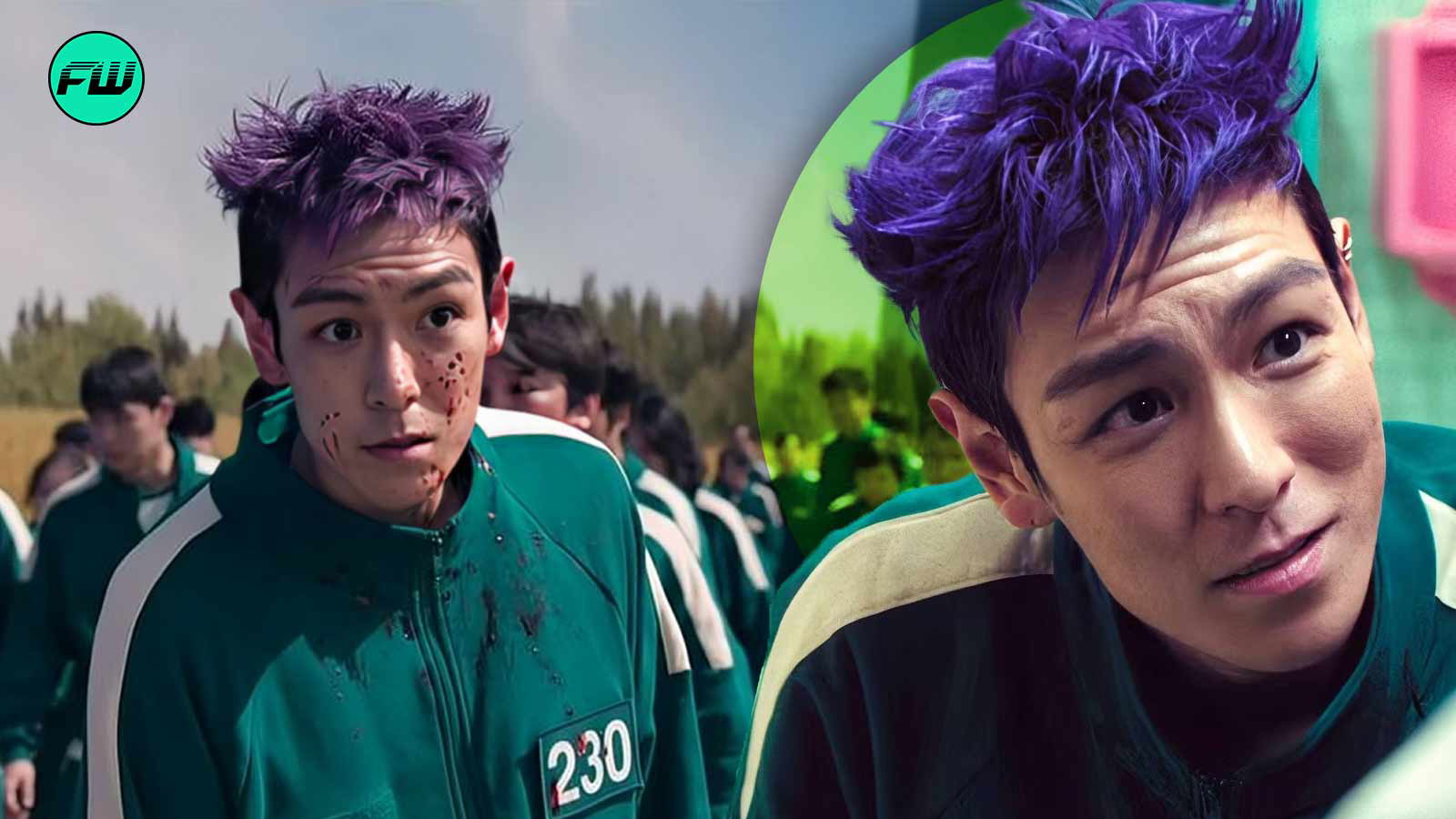When Netflix revealed that T.O.P (Choi Seung-hyun) would appear in Squid Game: Season 2 as a mysterious contestant named Thanos, the internet buzzed with curiosity. How would this eccentric, purple-haired rapper fit into the gritty, violent world of Squid Game? The answer was both surprising and moving. Beneath the bright colors, bold swagger, and eccentric attitude lies one of the series’ most haunting characters — a man whose hunger for fame and redemption spirals into despair.
This article delves deep into Thanos’ backstory, personality, symbolism, and impact, exploring how he became one of Squid Game’s most unforgettable figures.
1. Who Is Thanos in Squid Game?
Thanos, whose real name is Choi Su-bong, is introduced as Player 230 in the 37th iteration of the deadly Squid Game. His nickname, “Thanos,” comes from his flamboyant style and purple hair, a direct nod to the iconic Marvel villain. But this nickname also serves a deeper purpose: it symbolizes his internal conflict — a man caught between power and destruction.
Born in Gwangju, South Korea, in 1987, Choi Su-bong once dreamed of becoming a famous rapper. He had the looks, confidence, and energy, but fame never found him. His life unraveled after he lost ₩1.19 billion (nearly a million U.S. dollars) in a cryptocurrency scam. Broke, ashamed, and suicidal, he stumbled into the Squid Game as his last desperate gamble for redemption.
Unlike other players driven purely by greed or debt, Thanos entered the game seeking meaning — or perhaps punishment. His story stands out as a tragic reflection of modern society’s obsession with wealth, fame, and digital glory.
2. A Character Built on Contradictions
Thanos is both larger-than-life and painfully human. He embodies contradictions — confidence mixed with fragility, charisma hiding desperation, and boldness masking fear.
His appearance instantly captures attention. He sports bright purple hair, painted fingernails, and eccentric clothing. His fashion isn’t just for style; it’s his armor, a defense against a world that ignored him. Every color, every accessory screams, “Notice me.”
But once the game begins, cracks appear beneath the glitter. The flamboyant performer becomes a terrified man struggling to survive. His loud persona clashes with the grim silence of the deadly arena, symbolizing how modern vanity shatters under pressure.
T.O.P described Thanos as a “never-before-seen character” in the Netflix Tudum interview. He and director Hwang Dong-hyuk intentionally designed him to feel both alien and familiar — a bright flame burning out in a world of despair.
3. Backstory: The Fall of a Dreamer
Before entering the game, Choi Su-bong was a failed musician trying to make a name in South Korea’s hypercompetitive entertainment scene. Like many dreamers, he craved recognition. He performed in small clubs, uploaded music online, and lived off short-lived gigs. When the cryptocurrency boom hit, he saw it as his ticket to success.
He invested everything he had — and borrowed even more — into a fraudulent crypto project that promised impossible returns. Within months, everything vanished. His savings, his future, his reputation — gone.
In his final moments of despair, Su-bong received a mysterious invitation card embossed with the shape of a circle, triangle, and square — the symbols of Squid Game. To him, it felt like fate offering one last performance. Little did he know, this stage would demand his life.
4. Personality and Behavior
Thanos’ personality is a kaleidoscope of emotions. He’s witty, spontaneous, and unpredictable, often switching between laughter and rage in seconds. His conversations mix Korean and English, reflecting both his artistic identity and emotional instability.
He tries to bond with others, flirting and cracking jokes, yet remains an outsider. Some contestants mock him for his eccentric style, while others fear his volatility. His tendency to act without thinking — such as taunting guards or mocking stronger players — becomes his undoing.
However, he also shows surprising empathy. During one of the early rounds, he tries to comfort a terrified player, saying, “At least we’re still breathing. That’s something.” This brief moment of humanity reminds viewers that even the most flamboyant personalities can hide deep wounds.
5. The Purple Symbolism: More Than Just a Color
The color purple defines Thanos’ identity. In Western culture, purple often represents royalty, mystery, and ambition, but it can also symbolize madness and mourning. In Korean culture, it’s linked with creativity and spirituality — qualities that reflect Thanos’ artistic nature.
By dyeing his hair purple, Thanos visually distances himself from reality. It’s a rebellion against conformity and a desperate cry for individuality. But it’s also a metaphor for transformation — like a chameleon changing color to survive.
T.O.P and the creative team confirmed that the color was a deliberate choice, connecting Thanos to the Marvel villain of the same name. While Marvel’s Thanos seeks balance through destruction, Squid Game’s Thanos seeks peace through chaos — both driven by a twisted sense of purpose.
6. Substance Use and Mental Turmoil
In several scenes, Thanos is seen taking pills from a cross-shaped necklace. The wiki hints that these are psychiatric medications, possibly antidepressants or anti-anxiety pills. His erratic behavior — sudden laughter, bursts of anger, emotional breakdowns — implies he’s struggling with mental instability.
This detail adds depth to his character. He’s not just reckless; he’s haunted by trauma. The cross necklace symbolizes both faith and dependence, showing his reliance on substances to numb his pain. It’s one of Squid Game’s subtle commentaries on the hidden mental health crisis among struggling artists and debt-ridden youth.
7. Key Scenes That Define Thanos
a. Red Light, Green Light
Thanos enters the first game confident and playful. He jokes, flirts, and mocks others, unaware of the danger. When the first shots ring out, his smirk fades. The shock on his face mirrors the audience’s — the realization that death is real here. It’s the first time his flamboyant facade crumbles.
b. The Dormitory Confrontation
After surviving the first round, tensions rise. Thanos clashes with other players, his pride refusing to back down. A memorable moment occurs when he delivers an impromptu rap about survival, half-mocking and half-inspiring others. The mixture of rhythm and fear makes this one of the season’s most striking scenes.
c. The Bathroom Fight
His final scene is brutal. In a heated confrontation with Lee Myung-gi, a fellow contestant, Thanos lashes out verbally and physically. Myung-gi, enraged, stabs him with a metal fork — under the chin, then the throat. It’s messy, emotional, and deeply human.
As Thanos collapses, his purple hair soaks in blood, turning a darker shade — a haunting visual metaphor for his descent. Even in death, his flamboyance remains.
8. Symbolism and Themes
Thanos isn’t just a character; he’s a commentary on modern identity and self-destruction.
- The pursuit of fame: His entire persona reflects the hunger for recognition in the digital age. He craves validation — from fans, society, anyone.
- The illusion of control: Like many who chase crypto dreams or viral fame, he believes he can control his destiny — until reality crushes him.
- The mask of performance: His rapper identity shields his fragility. In Squid Game, that mask becomes useless.
- Materialism vs. meaning: Thanos embodies how people trade peace for attention, investing not just money but their souls into fragile illusions.
His story reminds us that the Squid Game isn’t only about money — it’s about the cost of losing oneself in pursuit of success.
9. Behind the Scenes: T.O.P’s Creative Vision
When Netflix announced that Choi Seung-hyun (T.O.P) would play Thanos, fans were intrigued. T.O.P had been absent from acting for several years, focusing on art and music. In the Tudum interview, he revealed that he wanted to challenge himself with something totally unexpected.
“I wanted to create a character who feels real yet surreal,” he said. “Someone who looks powerful on the outside but is breaking apart inside.”
Director Hwang Dong-hyuk gave him creative freedom with the character’s design. The purple hair, multi-colored nails, and poetic dialogue were largely shaped by T.O.P’s own artistic input.
This collaboration birthed a character that transcended the show — not just a contestant, but a symbol of self-expression in a world of conformity.
10. Fan Reactions and Cultural Impact
The moment Thanos appeared in the trailer, fans went wild on social media. His look — half rock star, half rebel — sparked memes, fan art, and debates. Some compared him to a “K-pop Joker,” while others admired his tragic depth.
Critics praised T.O.P’s performance for adding vibrancy to Squid Game’s otherwise grim tone. His short screen time didn’t stop him from becoming a cult favorite.
After his death scene aired, the hashtag #RIPThanos trended globally. Many fans interpreted his story as a metaphor for the real-world pressures faced by celebrities and creatives in Korea — fame, debt, and public scrutiny.
11. Why Thanos Matters in Squid Game’s Storyline
Every season of Squid Game introduces characters representing different facets of society — the worker, the immigrant, the gambler, the student. Thanos represents the artist, the dreamer who burns too bright.
His flamboyance contrasts sharply with the show’s muted tones. His presence injects color — literally and metaphorically — into a world defined by despair. Through him, viewers see how even creativity and passion can be crushed under capitalism’s ruthless weight.
Moreover, his death is symbolic: it’s the death of art, individuality, and expression in a system designed to punish nonconformity.
12. The Legacy of Thanos
Though he appears only in part of the season, Thanos leaves a lasting imprint. Later episodes briefly show hallucinations of him — his laughter echoing in another player’s memory. This ghostly presence serves as a reminder that no one truly leaves the Game untouched.
His legacy extends beyond the show. Thanos became a cultural touchpoint for discussions on mental health, artistic pressure, and the illusion of online success. Many fans interpret his story as a warning: don’t let the pursuit of fame erase your humanity.
13. The Real-World Mirror
What makes Thanos resonate so deeply is how real he feels. He represents the millions of young people chasing success in unstable industries — streaming, crypto, influencer marketing — where one mistake can destroy everything.
His addiction to validation mirrors society’s obsession with social media likes and followers. His downfall, though tragic, feels almost inevitable. In a sense, Thanos isn’t just a Squid Game character; he’s a reflection of our age — colorful on the outside, broken within.
Conclusion
Thanos from Squid Game Season 2 is more than a flamboyant player with purple hair — he’s a poetic tragedy wrapped in color and chaos. His journey from a failed rapper to a doomed contestant exposes the cost of living in a world obsessed with image, money, and recognition.
Through Thanos, Squid Game reminds us that even in our most vibrant moments, pain can lurk beneath the surface. He teaches us that chasing fame without purpose leads only to emptiness — and that sometimes, the brightest lights burn out the fastest.
In his death, Thanos achieves what he always wanted — to be remembered. Not as a winner, but as a symbol of humanity’s fragile dance between ambition and despair.
FAQs
1. Who plays Thanos in Squid Game Season 2?
Thanos is played by Choi Seung-hyun (T.O.P), a South Korean rapper and actor known for being a member of the K-pop group BIGBANG.
2. Why is he called Thanos?
His nickname comes from his purple hair, inspired by Marvel’s Thanos, and symbolizes his bold, rebellious personality.
3. How does Thanos die in Squid Game?
He dies after being stabbed under the chin and throat with a metal fork by fellow contestant Lee Myung-gi during a heated fight.
4. What does Thanos symbolize in the series?
He represents artistic ambition, vanity, and the downfall of self-expression in a world dominated by greed and survival.
5. Why did T.O.P choose this role?
T.O.P wanted to challenge himself with a role that blended eccentricity and tragedy, creating a unique character unlike anyone else in Squid Game.

